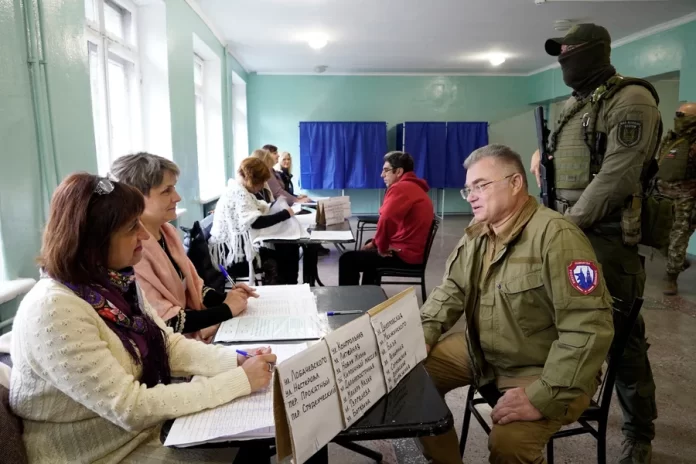Russian media reported that the United Russia party won more than 70 percent of the votes in the war-affected territories of Donetsk, Lugansk, Zaporizhzhia and Kherson.
The week-long elections, held amid criticism of vote fraud and Ukraine’s desire to return its territories, ended on Sunday.
The Council of Europe called these elections a blatant violation of international law. Kyiv and its supporters called the vote an illegal attempt to strengthen Moscow’s control over the regions in the south and east of Ukraine.
The results, published by Moscow and proxies, showed that voters supported Putin’s United Russia party, which had gained more than 70 percent of the vote in each of the four war-affected regions, according to Russian state news agencies.
None of the four regions is under the full control of the Russian army. Ukraine, which launched a counteroffensive to reclaim the lands, is slowly restoring territories in the Zaporizhzhia region. Kyiv also announced some successes in Donetsk around the destroyed city of Bakhmut.
Dmitry Medvedev, the former president of Russia and the leader of United Russia, thanked all the voters who came to cast the ballots.
“We value votes of all voters, but, probably, people living in our new territories … their votes have an absolute significance for our party. This is not a mere mandate of trust… to a certain extent, this is an act of civic courage indeed and our party should treat it this way.”
The United Russia party has won gubernatorial elections all across the country. However, electoral competition was limited in the regions, as strong candidates, including representatives of the main opposition Communist Party of Russia, were not allowed by the authorities to participate in the election race.
Stanislav Andreychuk, co-chairman of Golos, a voter rights group recognised by the Russian government as so-called “foreign agent,” claimed it was “not a real election” due to multiple cases of falsification.
Andreychuk reported on the detentions of opposition candidates and the destruction of their cars. He also mentioned a case of military draft papers handed to election observers.
They are doing some absolutely unimaginably things.
However, the Kremlin claims that the elections in Russia were free and fair.
Moscow Mayor Sergei Sobyanin, a close ally of Putin, was among the re-elected regional leaders. Before the elections, Muscovites praised Sobyanin for modernising the capital. A 21-year-old student Rukhin Aliyev told the AFP news agency:
Moscow is blossoming in front of our eyes.
Kremlin critics say elections in Moscow are easy to rig because of the capital’s electronic voting system, which cannot be verified. Today, similar systems are implemented in many other regions of Russia.
According to observers, only a few regions of Russia reported competitive cases. For instance, rivalry has arisen in remote Siberian Khakassia, where Governor Valentin Konovalov is running for re-election.
Mr. Konovalov, a Communist Party candidate, defeated a Kremlin-backed candidate in 2018 after a wave of regional protests.
This year, he faced Moscow-backed candidate Sergei Sokol, who portrayed himself as a “hero who fought in Ukraine.” Mr. Sokol dropped out at the last moment, citing health reasons.
